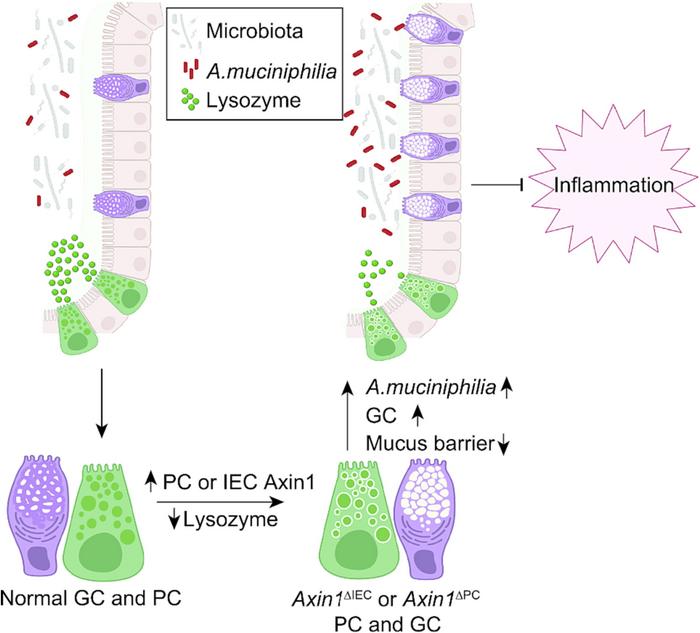A groundbreaking study conducted by Jun Sun’s research team at the University of Illinois Chicago has revealed a new and critical role of Axin1 in regulating intestinal epithelial development and microbial homeostasis. The research, published in the journal Engineering, highlights the potential therapeutic strategies for human inflammatory bowel disease (IBD).

Credit: Shari Garrett et al.
A groundbreaking study conducted by Jun Sun’s research team at the University of Illinois Chicago has revealed a new and critical role of Axin1 in regulating intestinal epithelial development and microbial homeostasis. The research, published in the journal Engineering, highlights the potential therapeutic strategies for human inflammatory bowel disease (IBD).
IBD, a chronic inflammatory disorder affecting the gastrointestinal tract, has been a significant health concern worldwide. The study focused on understanding the role of Axin1, a negative regulator of Wnt/β-catenin signaling, in maintaining gut homeostasis and host response to inflammation.
The research team analyzed Axin1 expression in human inflammatory bowel disease datasets and found increased Axin1 expression in the colonic epithelium of IBD patients. To further investigate the effects and mechanism of intestinal Axin1 in regulating intestinal homeostasis and colitis, the team generated new mouse models with Axin1 conditional knockout in intestinal epithelial cells (Axin1ΔIEC) and Paneth cells (Axin1ΔPC).
The results showed that Axin1ΔIEC mice exhibited altered goblet cell spatial distribution, Paneth cell morphology, reduced lysozyme expression, and an enriched presence of Akkermansia muciniphila (A. muciniphila) in the gut microbiota. Importantly, the absence of intestinal epithelial and Paneth cell Axin1 led to decreased susceptibility to dextran sulfate sodium-induced colitis in vivo.
Furthermore, when Axin1ΔIEC and Axin1ΔPC mice were cohoused with control mice, they became more susceptible to dextran sulfate sodium (DSS)-colitis, suggesting the protective role of Axin1 in the presence of a healthy gut microbiota. Treatment with A. muciniphila further reduced the severity of DSS-colitis, highlighting its potential as a therapeutic target.
Interestingly, antibiotic treatment did not change the proliferation of intestinal epithelial cells in the control mice. However, in Axin1ΔIEC mice with antibiotic treatment, the intestinal proliferative cells were significantly reduced, indicating the non-colitogenic effects driven by the gut microbiome.
These findings demonstrate the novel role of Axin1 in mediating intestinal homeostasis and the microbiota. The loss of intestinal Axin1 protects against colitis, likely through the regulation of epithelial Axin1 and Axin1-associated A. muciniphila. Further mechanistic studies using specific Axin1 mutations will be crucial in elucidating how Axin1 modulates the microbiome and host inflammatory response, paving the way for new therapeutic strategies for human IBD.
Jiaming Wu, editor of the subject of medicine and health of Engineering, commented, “This study provides valuable insights into the development of inflammatory bowel disease and offers potential therapeutic strategies for its treatment. By understanding the intricate interactions between Axin1, the gut microbiota, and host immunity, researchers can develop targeted interventions to restore intestinal homeostasis and alleviate the symptoms of IBD.”
The research team’s findings have significant implications for the field of gastroenterology and hold promise for the development of novel treatments for IBD. As further studies are conducted, the scientific community eagerly awaits the potential therapeutic breakthroughs that may arise from this research.
The paper “Profiling the Antimalarial Mechanism of Artemisinin by Identifying Crucial Target Proteins”, authored by Shari Garrett, Yongguo Zhang, Yinglin Xia, Jun Sun. Full text of the open access paper: https://doi.org/10.1016/j.eng.2023.06.007. For more information about the Engineering, follow us on Twitter (https://twitter.com/EngineeringJrnl) & like us on Facebook (https://www.facebook.com/EngineeringPortfolio).
About Engineering
Engineering (ISSN: 2095-8099 IF:12.8) is an international open-access journal that was launched by the Chinese Academy of Engineering (CAE) in 2015. Its aims are to provide a high-level platform where cutting-edge advancements in engineering R&D, current major research outputs, and key achievements can be disseminated and shared; to report progress in engineering science, discuss hot topics, areas of interest, challenges, and prospects in engineering development, and consider human and environmental well-being and ethics in engineering; to encourage engineering breakthroughs and innovations that are of profound economic and social importance, enabling them to reach advanced international standards and to become a new productive force, and thereby changing the world, benefiting humanity, and creating a new future.
Journal
Engineering
DOI
10.1016/j.eng.2023.06.007
Article Title
Intestinal Epithelial Axin1 Deficiency Protects Against Colitis via Altered Gut Microbiota
Article Publication Date
25-Jul-2023




